|
Course Description and History
(back
to top)
Hist 133Q, "Readings in Holocaust History," is one of my favorite
courses to teach, because we read the best books on a subject and discuss the issues they raise in great dept. I first taught this seminar in 1998,
twice in 1999, then again in 2001, 2004, 2006 and 2008 (see the syllabi:
1998, 1999 winter,
1999 fall, 2001,
2004, 2006, 2008).
Basically, in this seminar of about 15 students, we read a book a week
(long or thematically complex books are spread over 2 weeks). Each week
teams of 2 or 3 students work with me preparing background material and help to lead the discussion,
while other students either write a 2-page essay on a guiding question,
or formulate 6-10 questions of their own.
Class time is almost completely devoted to discussion, with the discussion
leaders or professor presenting background material as necessary. (Prior
to enrolling, all students should already have substantial knowledge of
Holocaust history--completion of or parallel enrollment in one of my other
courses is normally required.)
Each student also prepares a more substantial paper on their
book or topic.
Each time I offer the course I keep some of the students' favorite books from
the previous time, and choose a theme to guide the rest of the selection.
- 1998.
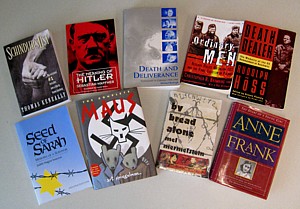
The 9 books
for Winter 1998
|
The first time I taught this seminar I picked 9 of what I consider
superior introductory books on the Holocaust, each paired with a scholarly
essay:
- Thomas Keneally's Schindler's List (1982)(with viewing of 1993 movie),
- Sebastian
Haffner's The Meaning of Hitler (1979);
- Michael Burleigh's Death and Deliverance on Euthanasia (1994);
- Browning's Ordinary
Men (1992);
- Auschwitz commandant Rudolf Höss's memoir (1992);
- Judith Isaacson's
memoir of a female survivor's experience, Seed of Sarah (1990);
- Art
Spiegelman's Maus (1986, 1991);
- Mel Mermelstein's anti-denial Auschwitz
memoir (1993); and
- Anne Frank's diary (1946 etc.).
- see 1998
syllabus
- 1999-Winter.
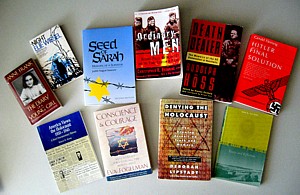
The 10 books
for Winter 1999
|
For the second offering I chose Teaching
the Holocaust as the theme, with:
- Anne Frank's
diary (1946) and Elie Wiesel's Night (1958); then
- Isaacson (1990) and Browning (1998 edition) again;
followed by
- a new Hitler book, Gerald Fleming's Hitler and the Final Solution, (1984);
- Robert Abzug's commented
source collection America Views the Holocaust (1998);
- Eva Fogelman's
book about rescuers Conscience and Courage (1994);
- Deborah Lipstadt's scholarly work on Holocaust
denial (1993); and
- Anne Frank and the World (1998), a collection of essays about using Anne Frank's diary in
the classroom.
- I didn't assign the scholarly essays to everyone this
time, but helped the presenting teams to find appropriate background
readings. Instead, I started using the guiding questions for the rest
of the class, and finishing up the readings with a more challenging
book.
- see winter 1999 syllabus
- 1999-Fall.
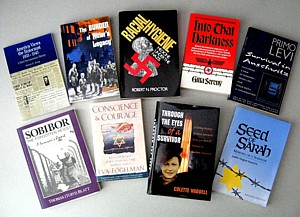
The 9 books
for Fall 1999
|
Guilt and Responsibility was the theme of the third offering of this seminar. Readings started with
- Abzug's source
collection on the US and the Holocaust (1998);
- Alfon's Heck's Burden of
Hitler's Legacy (1988);
- Proctor's Racial Hygiene (1988);
- Gitta Sereny's
biography of Treblinka commandant Stangl Into that Darkness (1983);
- Primo Levi's Survival
in Auschwitz (1947);
- Thomas Blatt's memoir of the Sobibor uprising (1997);
- Fogelman's Conscience and Courage (1994);
- a visit
by Holocaust survivor Nina Morecki; and finally
- Isaacson's Seed
of Sarah (1990).
- see fall 1999
syllabus
- 2001.
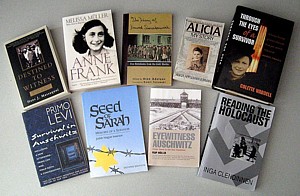
The 9 books
for Fall 2001
|
After a two-year break I wanted to read some
great new survivor memoirs that had been published, so I chose the Range
of Victims' Experiences as the theme in 2001. We began
with:
- the memoir of afro-German Hans Massaquoi (1999); continued with
- Melissa
Müller's biography of Anne Frank (1998);
- Dawid Sierakowiak's Lodz diary (1996);
- Alicia Appleman-Jurman's memoir (1988);
- a visit by Nina Morecki; Primo
Levi's memoir again (1947); followed by
- Isaacson's memoir (1990, a perennial favorite);
- Auschwitz Sonderkommando Filip Müller's memoir (1999); and concluded with
- Australian anthropologist Inga Clendinnen's reflections on Holocaust
historiography Reading the Holocaust (1999).
- see
2001syllabus; my fall 2001 Hist
133D website contains links for these books
- 2004.
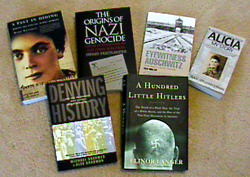
6 of the
7 books for Winter 2004 (+Fogelman)
|
After another long break, in 2004 I chose Histories and
Memories as the theme, with:
- Mark Roseman's Past
in Hiding;
- Henry Friedlander's book on Euthanasia;
- Filip Müller's Sonderkommando memoir;
- Appleman-Jurman's Story;
- Fogelman
on rescuers again (also a perennial favorite, because students like
its positive stories);
- Shermer and Grobman's new book on Holocaust denial;
and finally
- Elinor Langer's 100 Little Hitlers on a skinhead
murder of an African immigrant in Oregon (Langer had presented her book
on the UCSB campus the preceding quarter).
- see 2004
syllabus
- note after the course: I think the student-led discussions didn't work
as well this year, so I think next time I'll go back to leading the
first hour myself.
- 2006.
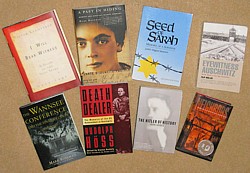
The 8 books
for Winter 2006
|
This year's theme was Testimony and Memory.
We started by taking two weeks to read:
- Victor Klemperer's diaries for
1933-1941; then again
- Mark Roseman's Past in Hiding; back to
another perennial favorite with
- Isaacson's Seed of Sarah; also
repeating
- Müller's Sonderkommando memoir; then
- Roseman's book on
the Wannsee conference (as an analysis of various sources);
- Auschwitz
commandant Höss's memoir;
- Lukacs' study of books about Hitler,
and finally
- Jan Gross's Neighbors, a study of a massacre in
an eastern Polish town.
- Klemperer, Wannsee and Lukacs on Hitler I've
never used before; I tried Gross in a 4-unit GE
freshman seminar in 2003, and it didn't work (too challenging).
- See 2006 syllabus
- 2008.
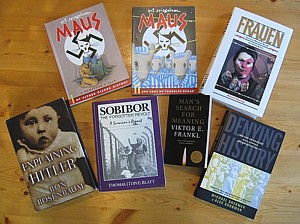
The 6 books
for Winter 2008 (diff. Sobibor book)
|
This year the seminar met on Mondays, so we only had 8 sessions (M.L. King and Presidents' Days). I had the opportunity to bring to guest authors to class: Alison Owings, who interviewed about 50 German women for her book Frauen, and Thomas Toivi Blatt, a survivor of the Sobibor extermination center and participant in the 1943 uprising there. I decided to do a biographical theme: how oral history and documents are used to write biographies and autobiographies, how survivors try to create meaning out of their experiences, and how some people try to negate that meaning. Most books were "new" this year, although I had used
- Maus and
- Grobman/Shermer's Denying History before, as well as selections from
- Owings' Frauen,
- Blatt's Sobibor, and
- Rosenbaum's Explaining Hitler before.
|






